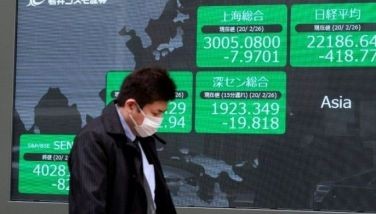Napolitano re-elected Italy's president
ROME (AP) — Italy's Parliament on yesterday re-elected Giorgio Napolitano as the nation's president to an unprecedented second term after party leaders persuaded the aging head of state to serve again in hopes of easing the hostile political climate that has thwarted formation of a new government for the economically stagnant eurozone member.
The 87-year-old Napolitano easily surpassed the simple majority required to be elected yesterday afternoon. He garnered 738 votes, far more than the 504 needed for victory for another seven-year mandate.
Parliament had a much harder time. It took it three days of balloting to choose a president, reflecting the legislature's deep polarization following inconclusive nationwide elections in February.
After the weeks of stalemate, once he takes a new oath of office Monday, Napolitano can formally begin one of the head of state's most important tasks — figuring out who has the most solid prospects of putting together a new government with enough support to successfully work with Parliament and, crucially, survive a mandatory vote of confidence from lawmakers.
That won't be easy. Italy's main political parties — essentially three distinct ideological blocs in Parliament and their often shifting allies — are heavily polarized, and the antagonism only grew sharper during the frustrating gridlock this year.
Napolitano, a former Communist, will have to quickly start sounding out parties about a potential premier. The next government faces pressure to bring urgently needed economic and electoral reforms to the recession-mired nation plagued by political volatility.
Italy has had a caretaker government for months, led by economist Mario Monti, a Napolitano appointee whose harsh austerity measures of higher taxes, pension reform and slashed spending helped keep Italy from succumbing to the debt crisis.
Napolitano, citing his advanced age, had repeatedly refused to be a candidate for another term that would see him turn nearly 95 when it runs out. But he explained that he yielded to the appeals out of a sense of responsibility toward the nation.
"We must all look, as I tried to do in these hours, at the difficult situation of the country, at the problems of Italy and Italians, and the international image and role of our nation," Napolitano said in brief remarks from the presidential palace after his re-election. He said he would elaborate on how he planned to carry out his mandate in a speech Monday.
Monti, whose own election bid to stay on as premier was soundly rejected by angry voters, telephoned Napolitano to thank him for having agreed "with great spirit of sacrifice" to continue.
From Brussels, European Commission President Jose Manuel Barroso said in a congratulatory note that Napolitano will serve at a time when EU nations must "display great calmness, courage and farsightedness" amid calls from Europe's citizens for restored growth and jobs.
Still, while Napolitano's election received a standing ovation from lawmakers and plaudits from abroad, outside Parliament a noisy rally of several thousand people protested, disappointed that Italy's old political guard hadn't changed as they had hoped.
Lawmakers from Parliament's third-largest bloc, the anti-establishment 5 Star Movement led by comic-turned-political agitator Beppe Grillo, galvanized supporters for the protest. Grillo had backed a left-leaning constitutional law expert for president.
Grillo and his fast-growing movement are bitterly opposed to the incumbent, who in late 2011 appointed Monti and a Cabinet of technocrats to replace an elected premier as the eurozone debt crisis threatened to engulf Italy.
Hours earlier, Parliament held a fifth — and yet again unsuccessful — ballot to choose a head of state. But even as senators, deputies and regional electors put their folded paper ballots into urns in the Chamber of Deputies, leaders ranging from Monti to ex-Premier Silvio Berlusconi, were paying calls on Napolitano, one by one, at the presidential Quirinal palace on one of Italy's ancient hills to beg him to reconsider his refusal to serve again.
Napolitano's office said the leaders had made a "fervent appeal to reconsider his oft-given reasons to be unwilling to have a second term."
Italy's presidents traditionally serve only one term, but there is no prohibition against a second mandate.
It is possible Napolitano might only hope to serve part of the term, long enough to encourage agreement over the leader and makeup of the next government and to shepherd the electoral reforms he had vainly hoped would have been enacted before February's election, to boost chances for a more stable and productive Parliament.
Like his good friend, Benedict XVI, the retired pontiff, Napolitano could presumably resign from the post if he felt his physical or mental stamina wearing down by age.
Among those beaming and applauding Napolitano's re-election was Berlusconi. The billionaire businessman fell short in a comeback attempt in February elections for a fourth term as premier.
The conservative leader is eager to have a government that might rein in Italian prosecutors whom he contends sides with the left and is responsible for his judicial woes, including a trial of Berlusconi in Milan for allegedly paying an underage teenage woman for sex. Berlusconi has proclaimed his innocence.
Also lobbying the president was Democratic Party leader Pier Luigi Bersani, whose lawmakers cast blank ballots yesterday morning in a stalling tactic as he struggled to find a candidate supported by a wide consensus. The Democratic Party has been imploding under a leadership crisis since disappointing results in parliamentary elections. Bersani's forces control the Chamber of Deputies, but not the Senate. Tapped by Napolitano to see if he could pull together a government before the presidential election, Bersani failed, after refusing an offer by Berlusconi to join their bitterly opposed forces in a reform-focused coalition.
Bersani's hours as party leader were numbered after the latest humiliation from his own ranks, when party defectors Friday in the secret balloting for president sabotaged his high-profile choice of candidate, former Premier Romano Prodi, an economist who is widely respected at home and abroad.
A top party official, Enrico Letta, confirmed that Bersani and the rest of Democratic Party leadership, including himself, had resigned after the vote for Napolitano.
"Thank you, Napolitano," Bersani said, although he noted that the "political problem" plaguing the country still remains.
Italy is living through political "chaos squared," political science professor James Walston, of American University of Rome, wrote in his blog.
Meanwhile, rallying to the side of citizens feeling neglected by their political class were leaders of Italy's politically influential Catholic church.
"Too many people are living in misery," Naples Cardinal Crescenzio Sepe said in an appeal for action that he wrote for a local diocesan weekly. "There are people who are dying because of poverty imposed on them," the cardinal of that southern city said, urging politicians to "find rapid solutions. Do so quickly."
- Latest
- Trending

































